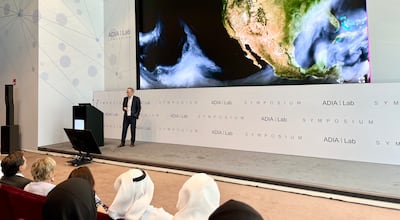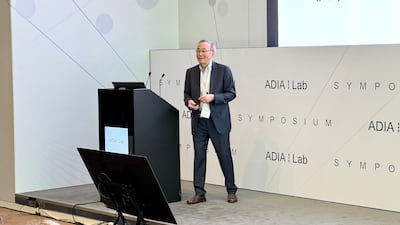Former US energy secretary Steven Chu says that a spike in extreme weather caused by climate change is increasing power outages, but that artificial intelligence can help better manage the transmission and distribution systems required by renewable energy to blunt the impact of outages.
During a keynote speech in Abu Dhabi, he also said that although AI is increasing energy demand, there's the potential for researchers and tech experts to invent a new architecture to make AI more sustainable.
"Already people are very motivated to decrease the energy consumption of AI in two ways, one is in the software, to make the machine learning more streamlined and give the queries less scope, and they're also trying to do things with hardware," Mr Chu told a packed auditorium on Wednesday at during a symposium hosted by Adia Lab, Abu Dhabi’s independent institute dedicated to research in data and computer sciences.
"If you look at Nvidia's website, you can see they're bragging about how low in terms of energy per unit for operation, the H100 is, it's about a kilowatt of power for one chip, but they claim it's very low compared to what it does for one chip," he explained, pointing out if those efficiencies would be eventually transferred to the hundreds of thousands of servers already in existence, a significant reduction of energy consumption could be possible.
He also explained that AI can help utility companies and customers take more control over their energy production and consumption, potentially saving energy resources, money and energy.

"If the customers knew that a particular utility is being strained at various moments, and it's costing the utility companies more money, and in turn, costing them more money, they might say 'I don't want to run my clothes washer at this time', but most people right now aren't aware when utility companies are under strain," he said, noting that smart appliances and AI might make it possible to assist with energy automation and customer knowledge.
"Most people aren't aware what's really happening, but with smart appliances and a distributed form of AI can help, consumers could potentially sign up on a voluntary basis to share your energy load and the utility company could give you a lower bill," he said.
Shortly after his keynote speech at the symposium which lasted just under one hour, Mr Chu also answered a question about president-elect Donald Trump's choice for energy secretary, Chris Wright, saying he believed Mr Wright will most likely push for the US to leave the Paris Climate Agreement that was signed by more than 190 countries.
“It’s a totally different sea change, which is quite sad,” Mr Chu said, responding to a question from The National. He also expects Mr Wright to slow down America's drive towards renewable energy sources and eliminate financial incentives for various climate initiatives.
Mr Chu, a Physics Nobel laureate who serves as an advisory board member of Adia Lab, was speaking about sustainability in the context of artificial intelligence on Wednesday before being asked for his thoughts on the nomination of Mr Wright, a veteran oil executive who founded and has led Colorado-based Liberty Energy since 2011.
“You might think it’s only four years,” Mr Chu said, referring to the presidential election cycles and how long Mr Wright might serve if confirmed by the US Senate.
“But remember, more than half the country voted for this person [Mr Trump] and a large fraction of the people don’t want to spend money on climate change, and so we’ve got a problem in the United States.”



